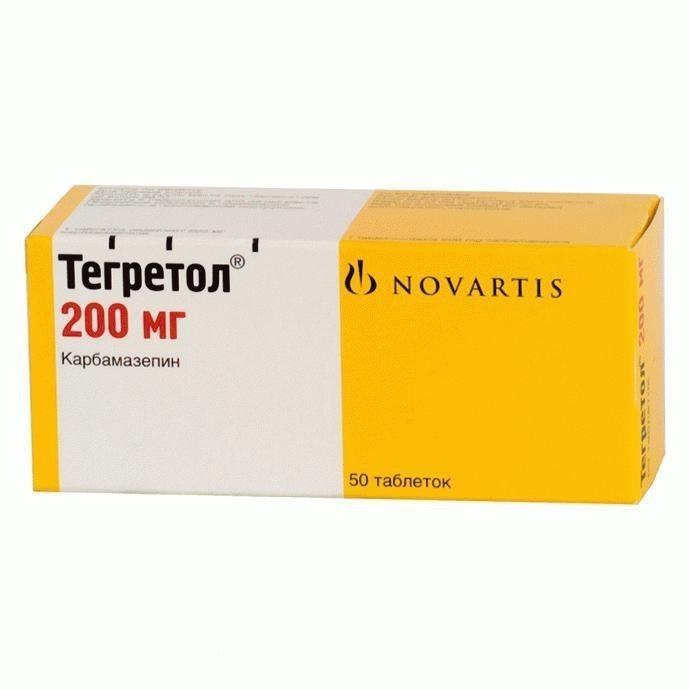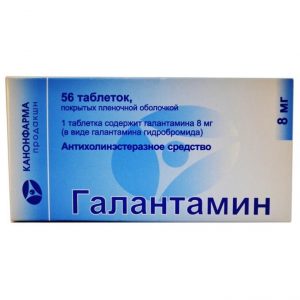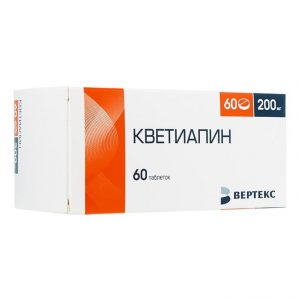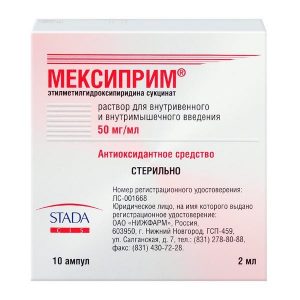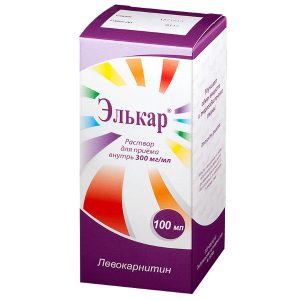Description
Latin name
Tegretol
Release form
White tablets, round, flat, chamfered, CG marked on one side, G / K and risk marking on the other.
Packing
10 pcs – blisters (5) – packs of cardboard.
Pharmacological action
Antiepileptic drug derived from tricyclic iminostilbene. Believe that anticonvulsant action is associated with a decrease in the ability of neurons to maintain a high frequency of development of repeated action potentials through inactivation of sodium channels. In addition, it seems that the inhibition of neurotransmitter release by blocking presynaptic sodium channels and the development of action potentials is important, which in turn reduces synaptic transmission.
It has a moderate antimanic, antipsychotic effect, as well as an analgesic effect for neurogenic pain. GABA receptors, which may be associated with calcium channels, may also be involved in the mechanisms of action, and the effect of carbamazepine on neurotransmitter modulator systems seems to be of importance.
The antidiuretic effect of carbamazepine may be associated with a hypothalamic effect on osmoreceptors, which is mediated through the secretion of ADH, and is also due to a direct effect on the renal tubules.
Pharmacokinetics
After oral administration, carbamazepine is almost completely absorbed from the digestive tract. Binding to plasma proteins is 75%. It is an inducer of liver enzymes and stimulates its own metabolism.
T1 / 2 is 12-29 hours. 70% is excreted in the urine (in the form of inactive metabolites) and 30% – with feces.
Indications
Epilepsy: large, focal, mixed (including large and focal) epileptic seizures. Pain syndrome predominantly of neurogenic origin, incl. essential trigeminal neuralgia, trigeminal neuralgia in multiple sclerosis, essential glossopharyngeal neuralgia. Prevention of attacks with alcohol withdrawal syndrome. Affective and schizoaffective psychoses (as a means of prevention). Diabetic neuropathy with pain. Diabetes insipidus of central origin, polyuria and polydipsia of neurohormonal nature.
Contraindications
AV block, previous myelodepression, intermittent porphyria in history, simultaneous administration of MAO inhibitors and lithium preparations, hypersensitivity to carbamazepine.
If necessary during pregnancy (especially in the first trimester) and during lactation, the expected benefit of treatment for the mother and the risk to the fetus or child should be carefully weighed. In this case, carbamazepine is recommended to be used only as monotherapy in the minimum effective doses.
Women of childbearing age are advised to use non-hormonal contraceptives during treatment with carbamazepine.
Use in cases of impaired liver function
Use with caution in cases of severe impaired liver function.
Use for impaired renal function
Use with caution for severe impaired renal function.
Use in children
Use with caution in children.
Use in elderly patients
Use with caution in elderly patients.
Use during pregnancy and lactation
If necessary during pregnancy (especially in the first trimester) and during lactation, the expected benefit of treatment for the mother and the risk to the fetus or child should be carefully weighed. In this case, carbamazepine is recommended to be used only as monotherapy in the minimum effective doses.
Women of childbearing age are advised to use non-hormonal contraceptives during treatment with carbamazepine.
Composition
1 tab.
carbamazepine 200 mg
Excipients: microcrystalline cellulose – 65 mg, sodium carmellose – 10 mg, magnesium stearate – 3 mg, colloidal silicon dioxide – 2 mg.
Dosage and administration
Install individually. When taken orally for adults and adolescents 15 years of age and older, the initial dose is 100-400 mg. If necessary, and taking into account the clinical effect, the dose is increased by no more than 200 mg / day with an interval of 1 week. The frequency of administration is 1-4 times / day. The maintenance dose is usually 600-1200 mg / day in divided doses. The duration of treatment depends on the indications, the effectiveness of the treatment, the patient’s response to therapy.
In children under the age of 6, 10-20 mg / kg / day are used in 2-3 divided doses, if necessary, and taking into account tolerance, the dose is increased by no more than 100 mg / day with an interval of 1 week. the maintenance dose is usually 250-350 mg / day and does not exceed 400 mg / day. Children aged 6-12 years – 100 mg 2 times / day on the first day, then the dose is increased by 100 mg / day with an interval of 1 week. until the optimal effect is obtained, the maintenance dose is usually 400-800 mg / day.
Maximum doses: when taken orally, adults and adolescents 15 years of age and older – 1.2 g / day, for children – 1 g / day
Side effects of
From the side of the central nervous system and peripheral nervous system: often dizziness, ataxia, drowsiness, headache, diplopia, accommodation disturbances are rare – involuntary movements, nystagmus in some cases – oculomotor disturbances, dysarthria, peripheral neuritis, parestic neuritis, parestis , symptoms of paresis, hallucinations, depression, a feeling of fatigue, aggressive behavior, agitation, impaired consciousness, increased psychosis, impaired taste, conjunctivitis, tinnitus, hyperacusis.
From the digestive system: nausea, increased GGT, increased activity of alkaline phosphatase, vomiting, dry mouth rarely – increased activity of transaminases, jaundice, cholestatic hepatitis, diarrhea or constipation in some cases – decreased appetite, abdominal pain, glossitis, stomatitis.
From the cardiovascular system: rarely – myocardial conduction disturbances in some cases – bradycardia, arrhythmias, AV blockade with syncope, collapse, heart failure, manifestations of coronary insufficiency, thrombophlebitis, thromboembolism.
From the hemopoietic system: leukopenia, eosinophilia, thrombocytopenia is rare – leukocytosis in some cases – agranulocytosis, aplastic anemia, erythrocyte aplasia, megaloblastic anemia, reticulocytosis, hemolytic anemia, granulomatous hepatitis.
From the side of metabolism: hyponatremia, fluid retention, edema, weight gain, decreased plasma osmolality in some cases – acute intermittent porphyria, folic acid deficiency, calcium metabolism disorders, increased cholesterol and triglycerides.
From the endocrine system: gynecomastia or galactorrhea rarely – thyroid dysfunction.
From the urinary system: rarely – impaired renal function, interstitial nephritis and renal failure.
From the respiratory system: in some cases – dyspnea, pneumonitis or pneumonia.
Allergic reactions: skin rash, itching rarely – lymphadenopathy, fever, hepatosplenomegaly, arthralgia.
Drug Interaction
When co-administered with CYP3A4 isoenzyme inhibitors, carbamazepine plasma concentrations may be increased.
With the simultaneous use of CYP3A4 isoenzyme inducers, it is possible to accelerate the metabolism of carbamazepine, reducing its concentration in blood plasma, reduction of therapeutic effect.
When used simultaneously, carbamazepine stimulates the metabolism of anticoagulants, folic acid.
When administered with valproic acid, a decrease in carbamazepine concentration and a significant decrease in the concentration of valproic acid in the blood plasma may occur. The concentration of the metabolite of carbamazepine – carbamazepine-epoxide (probably due to the inhibition of its conversion into carbamazepine-10,11-trans-diol), which also has anticonvulsant activity, so the effects of this interaction can be offset, but more often side effects occur. dizziness, vomiting, weakness, nystagmus. The concomitant use of valproic acid and carbamazepine may lead to the development of a hepatotoxic effect (apparently, due to the formation of a secondary metabolite of valproic acid, which has a hepatotoxic effect).
Valpromide reduces carbamazepine and its carbamazepine epoxide metabolism due to inhibition of the enzyme epoxide hydrolase when co-administered with valpromide. This metabolite has anticonvulsant activity, but with a significant increase in the concentration in the blood plasma can have a toxic effect.
With concomitant use with verapamil, diltiazem, isoniazid, dextropropoxyphene, viloxazine, fluoxetine, cimetidine, acetazolamide, danazol, desipramine, nicotinamide (in adults) with itraconazole, ketoconazole, fluconazole), terfenadine, loratadine may increase the concentration of carbamazepine in the blood plasma with the risk of side effects (dizziness, drowsiness, ataxia, diplopia).
When co-administered with hexamidine, the anticonvulsant effect of carbamazepine with hydrochlorothiazide, furosemide is attenuated – a decrease in the blood sodium content with hormonal contraceptives is possible – the action of contraceptives may be impaired and the development of acyclic bleeding may occur.
When used with thyroid hormones, thyroid hormone elimination with clonazepam may be increased – clonazepam clearance may be increased and carbamazepine clearance with lithium drugs may be increased – the neurotoxic effect may increase.
When administered with primidone, a decrease in the concentration of carbamazepine in blood plasma is possible. There are reports that primidone may increase the plasma concentration of a pharmacologically active metabolite, carbamazepine-10,11-epoxide.
When co-administered with ritonavir, carbamazepine side effects with sertraline may be increased – sertraline with theophylline, rifampicin, cisplatin, doxorubicin may be decreased – carbamazepine may be decreased in blood plasma with tetracycline – carbamazine may be attenuated.
When co-administered with felbamate, it is possible to decrease the concentration of carbamazepine in the blood plasma, but to increase the concentration of the active metabolite of carbamazepine-epoxide, while reducing the concentration in the plasma of felbamate.
When used with phenytoin, phenobarbital decreases the concentration of carbamazepine in blood plasma. Mutilation of anticonvulsant action is possible, and in rare cases – its strengthening.
Overdose
Symptoms
Central nervous system
CNS dysfunction disorientation, drowsiness, agitation, hallucinations, Coma blurred vision, indistinct speech, Dysarthria, Nystagmus, Ataxia, Ataxia dyskinesia, Hyperreflexia (at first), Hyporeflexia (later) convulsions, psychomotor disorders, myoclonus, hypothermia, Mydriasis.
Respiratory system
Respiratory depression, pulmonary edema.
Cardiovascular system
Tachycardia, arterial hypotension sometimes – hypertension, conduction disturbances with expansion of QRS complex cardiac arrest, syncope.
gastrointestinal tract
Vomiting, delayed passage of food from the stomach, decreased motility of the colon.
Urinary system
Urinary retention, oliguria or anuria fluid retention of hyponatremia dilution due to the effect of carbamazepine, similar to the action of the antidiuretic hormone.
Changes from laboratory parameters
Hyponatremia, metabolic acidosis is possible, hyperglycemia is possible, increase in the muscle fraction of creatinine phosphokinase.
Treatment.
Initially, treatment should be based on the patient’s clinical condition showing hospitalization. The concentration of carbamazepine in the plasma is determined to confirm the poisoning by this agent and to assess the degree of overdose.
Evacuation of gastric contents, gastric lavage, activated charcoal is carried out. Late evacuation of gastric contents may result in delayed absorption and recurrence of intoxication symptoms during recovery. Applied symptomatic supportive therapy in the intensive care unit, monitoring of cardiac function, careful correction of electrolyte disorders. There is no specific antidote.
Storage conditions
In the dark place at a temperature of no higher than 30 ° C.
Keep out of the reach of children.
The Expiration of
is 3 years.
Do not use after the expiry date stated on the package.
Active ingredient
Carbamazepine
pharmacy
pharmacy sdflfpfpfrd14pfp14rd14pfp14rdpfrd14pfrd14pfrd14pfrd14pfff1416
dosage form
dosage form
tablets
Novartis Farm Stein AG, Switzerland
